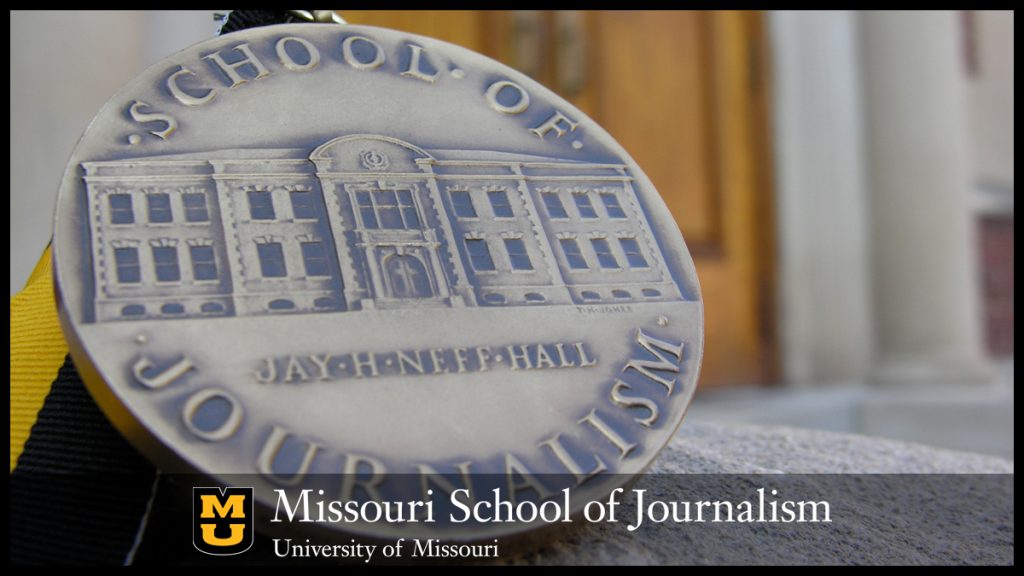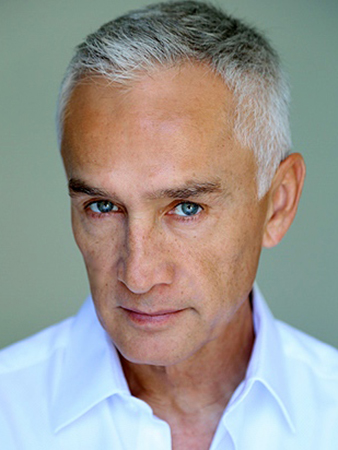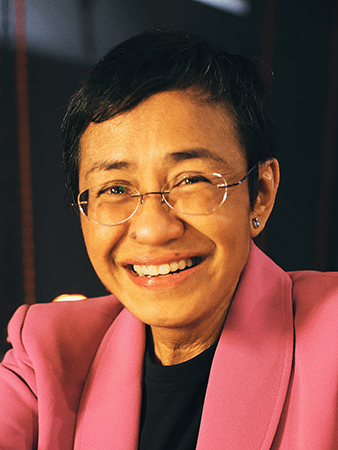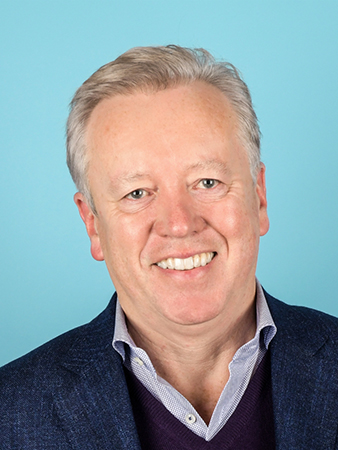Three industry titans to receive Missouri Honor Medal for Distinguished Service from Missouri School of Journalism

COLUMBIA, Mo. (June 2, 2025) — The Missouri School of Journalism has announced the winners of the 2025 Missouri Honor Medal, which recognizes extraordinary service in journalism and strategic communication.
The honorees — selected by the faculty of the School of Journalism — are Jorge Ramos, former host of Univision’s flagship news program Noticiero Univision for 38 years; Maria Ressa, co-founder and CEO of Filipino investigative news website Rappler and a winner of the Nobel Peace Prize; and John Saunders, chairman of global communications consultancy FleishmanHillard.
Ramos, Ressa and Saunders will accept their medals in person during a ceremony on Tuesday, Sept. 30, at the State Historical Society of Missouri. Earlier in the day, they will each present free, public master classes highlighting insights gained from their professional experiences.
“These medalists are powerful inspirations to students and professionals alike, and it’s a privilege to present them with the highest award bestowed by the School of Journalism,” said David Kurpius, dean of the School. “Their careers represent the highest standards of excellence and ethics.”
Past winners of the prestigious honor represent a broad range of distinguished figures in the industry, including Christiane Amanpour, Sir Winston Churchill, Walter Cronkite, Maria Hinojosa and Gloria Steinem.
Meet the medalists
Jorge Ramos

Until leaving the Spanish-language TV network at the end of last year, Jorge Ramos was perhaps the most recognizable face of Univision for nearly 40 years, during which time he anchored the flagship news program Noticiero Univision. Over the course of a career that has seen him compared to fellow Honor Medalist Walter Cronkite, he has covered a plethora of political and social upheavals, from the collapse of the Berlin Wall to the rise and fall of authoritarian regimes in Latin America.
Through it all, he has remained true to a firm code of ethics, sometimes resulting in public confrontations with those in power. Whether he was interviewing President Obama, President Trump or Venezuelan dictator Nicolás Maduro, he became known for demanding accountability — though that trait was evident even early in his career, when he left Mexico City’s XEW-TV after the station censored a story that was critical of the Mexican government.
This consistent strain of courage in his reporting has afforded him a large supply of anecdotes that back up his principles with real-world examples.
“When I had the opportunity to talk to Maduro, I needed to make a moral decision,” Ramos said. “It is very different to talk to a dictator than to a victim of that dictatorship, so I chose to do a confrontational interview. In the end, I was arrested and deported from Venezuela. It would have been easier to sit down and not say anything, but I think I made the right choice.”
When Ramos arrives on campus in September, he hopes to expand on that perspective when speaking with students who are preparing to enter the industry at a time of fast-paced change.
“Technology has changed our industry completely — for the first time, the new generation knows how to deal with the tools of journalism better than veterans like me,” he added. “But what hasn’t changed for decades is the moral and ethical element of journalism. Almost every decision you make as a journalist has to do with ethics. So if you understand that journalism is a public service, I think you see the profession in a different light.”
Citation: In recognition of his fearless journalism and unwavering commitment to holding power to account; for amplifying community voices and challenging authority on behalf of the public; and for his enduring impact as a trailblazing voice in Spanish-language media and beyond.
Maria Ressa

Maria Ressa won the Nobel Peace Prize in 2021 for her work as the co-founder and CEO of Rappler, a Filipino investigative news website that has faced continued attempts by the Filipino government to shut down or impair its operations and prosecute Ressa — moves widely seen as retaliation for critical coverage.
As the “fake news” phenomenon became prevalent in the U.S. during the 2016 presidential campaign, Rappler also charted its surge in the Philippines in concert with the ascension of then-president Rodrigo Duterte. Today, the site continues to expose corruption throughout the country. This investigative work — and the Duterte administration’s actions in response — have made Ressa something of a folk hero among journalists worldwide who work to hold powerful figures and institutions accountable.
Yet despite the international acclaim her work has garnered, Ressa remains grounded in the same community-centered ethic that drives the Missouri Method of hands-on education at the School of Journalism.
“When you’re investigative journalists, you’re often grim and determined because you’re looking at everything horrible,” Ressa said during a visit to the Nobel Prize Museum in Stockholm, Sweden, earlier this year. “But what are you really doing this for? You’re doing this for your community. And I’m always very hopeful.”
For Ressa, that hope has manifested not in passive thought, but in action — in a commitment to steadfast, fact-based reporting despite its risks. During a speech at the Vatican in January, she observed the incremental but powerful benefits of that approach.
“In a little over a year, my government filed 10 arrest warrants against me… I didn’t know what was going to happen, but Rappler and I just tried to do what was right,” she said. “And now, eight years — almost a decade — later, those 10 criminal charges are down to two.”
Citation: In recognition of her defense of press freedom, her groundbreaking investigative journalism in the face of authoritarian threats and her unwavering belief in the power of truth to protect democracy and keep the powerful accountable.
John Saunders

John Saunders is the chairman of global communications consultancy FleishmanHillard, having previously served as its president and CEO for almost a decade. In 1990, he founded FleishmanHillard Saunders, an international office of FleishmanHillard that would become Ireland’s largest public relations consultancy.
Fittingly, given that the School of Journalism’s curriculum offers training in both journalism and strategic communication, Saunders’ career began in journalism with a high-profile role as a radio and television sports presenter for Ireland’s public broadcasting service (unless, that is, one says it began at the age of 14, when he created what was then the only soccer magazine in Ireland). Scarcely past the age of 20, he became a star sports broadcaster in the country and was covering large-scale events like the Olympic Games.
His career in PR over the last 40 years has only added to his profile, as he has found international success in leadership roles with a company that ranges widely not only in terms of global reach but in clientele. FleishmanHillard’s website currently features campaigns promoting canola oil in the Americas, informing about the importance of adequate protein in the Asia-Pacific region and putting a fresh spin on breast health in Europe, the Middle East and Africa.
Having found success in both spheres, Saunders views journalism and strategic communication as being tied to similar bedrock principles of truth and integrity — he has remained a member of the National Union of Journalists, a trade union for journalists in the UK and Ireland, for nearly half a century.
“I’ve always taken a view that public relations is about earning trust, and it is about telling the truth,” he said. “There’s an absolute imperative not to tell lies. That’s incredibly important to me, and I have no doubt that comes from my background in journalism.”
He is now passing those principles along to those who no longer see him as the young, phenom sports presenter but as the veteran communicator and mentor, and he has found that doing so has given him a new perspective on the trajectory of his career.
“When I was a radio and TV presenter in Ireland, for the most part my career was about me,” Saunders said. “The next phase in public relations was about being responsible for teams — it was no longer about me, it was about us. And then in the phase I’ve moved into now, it has become about everybody except me. It’s all about the enterprise, about everybody else’s career. I think that’s a natural evolution.”
Citation: In recognition of his decades-long journey from journalist to global CEO, his leadership in public relations, his dedication to building a values-driven culture grounded in truth, collaboration and purpose, and his belief in the power of public relations to unite people and ideas across borders.
Updated: October 2, 2025